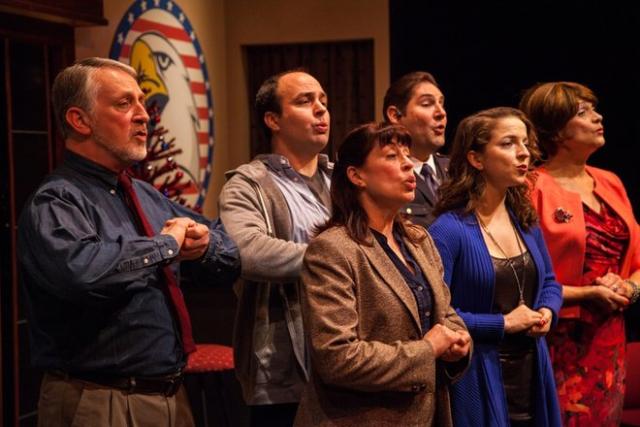
There seem to be no taboo topics at Next Act Theater, which has made its reputation by producing work that sometimes provokes its audience, causing it to question, to think, and perhaps to re-evaluate its own beliefs. Next Act’s current offering, A.R. Gurney’s Heresy, sounded like it would be a perfect fit. However, that’s not the case. The only thinking that audiences are likely to do while viewing this fiasco is: “When is the play going to end?”
One would expect more – much more – from a playwright with such stellar credentials. Gurney’s more well-known and oft-produced plays include The Dining Room (1988), The Cocktail Hour (1988), and Love Letters (1988). In fact, the latter was a finalist for the Pulitzer Prize and is currently being revived on Broadway. Even Heresy had a New York run in 2012 (not on Broadway, but in a small TriBeCa theater called the Flea). One cannot imagine that even an original cast as stellar as that one (Kathy Najimy and Annette O’Toole) could make much sense out of Gurney’s gibberish.
The Milwaukee production also has its “stars,” meaning such well-known and well-liked actors as Carrie Hitchcock (who plays a ditzy society wife), and Drew Brhel (as a military general). With a better script, they could create a blockbuster of a show.
Lesser-known cast members are fine in their respective roles, as well. Director David Cescarini, the company’s producing artistic director, attempts to add some spark to an otherwise flat situation. One only wishes he had made a better play selection.
The drama is set in the “near-future,” in an unnamed American city. A middle-aged couple (Mary and Joseph) is frantic about the whereabouts of their son, “Chris.” He is supposed to be in college, yet they hear from his roommate that Chris has been picked up by the police. They are waiting in a plush conference room (complete with bar) located within a military complex. Joseph is waiting to see an old Army buddy, Pontius, who he hopes can locate their son.
From the looks of the set, patriotism is rampant. An American flag sits in one corner. There’s also a tabletop-sized red, white and blue Christmas tree, and the flowers on the coffee table match the same color scheme. While they are waiting for Pontius to arrive, the couple discusses a growing number of late-night “crackdowns,” in which vandalism and looting seem to be the norm. One begins to wonder whether this play is the “gospel according to Gurney,” or a sequel to Orwell’s “1984.” When Pontius finally makes an entrance, he vows to cut through the red tape to locate Chris. As it turns out, Chris has been put in protective custody by Homeland Security, which is located in the same building. More characters arrive, and the discussion hinges on whether Chris is safer being held in protective custody or released to the street, where he might be killed by some right-wing advocate with a gun. Gurney peppers the plot with a series of weak jokes, such as comparing water-boarding to the “torture” of endless fundraising appeals on PBS TV stations. Before the play ends, the playwright also lets loose on all sorts of issues: mainstream religions, 9/11, consumerism, “the American Dream,” politics and violence. Oh, and he touches on contraception and abortion, too.
Chris is never seen by the audience, and Gurney fails to make us take any real interest in what happens to him. Oddly, though, the play gets a bit of juice in the second act, which is held in the Crackdown Cabaret. Chris’s roommate (Doug Jarecki), now transformed into the cabaret’s smarmy host and DJ, tells a number of stale jokes and invites the two waitresses to join him onstage for some bump-and-grind choreography. The “girls” are Chris’s girlfriend in Act I (Alexandra Bonesho) and Pontius’s wife (Hickcock). They are now a couple of barmaids and onstage performers.
The actor who plays Mary, Chris’s mother, in both acts (Mary Kababik), seems to be perennially stuck in an irritated mood. The more soft-spoken and calming Joe (Michael Pocaro) appears to be the most authentic character. Actor Brian Meyers, as Pontius Pilot’s obliging intern and scribe, becomes a lounge singer and keyboard player in Act II. When the final curtain comes down, it would be no wonder if audiences left shaking their heads, not quite sure what they had just seen. It certainly isn’t what one would expect from a playwright as heralded as A.R. Gurney.
